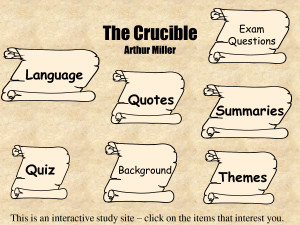

In early American settlements such as Salem, churches bound communities in both practical and symbolic ways, with negative and positive implications. In this way, a society based on class and race differences is on trial in the play. The play suggests that when we make baseless accusations against our most vulnerable citizens, we are in danger of extrapolating the injustice to all members of society. As the witch hunt escalates, even the play’s protagonists are assumed guilty despite their high moral and social standing. Initially, the poor and powerless characters are on trial essentially for their life circumstances, rather than any particular crime. Parris explains that the town more easily accepts accusations against unseemly characters like “Isaac Ward that drank his family to ruin,” so the accusations overwhelmingly target the indefensible and are easily manipulated to punish the immoral.

She in turn accuses Sarah Good and Sarah Osburn, who are interchangeably described as homeless drunks, after Putnam offers their names. Tituba, who, as a slave, has no power, is the first character to confess to witchcraft.

Read more about the law in Harper Lee’s novel, To Kill a Mockingbird.ĭuring the witch trials, the Salemites choose easy targets, and the accusations begin with The Crucible’s most vulnerable characters, underscoring the classism and racism of the times. When God can be invoked as the ultimate judiciary, there can be no system of checks and balances, and corruption in the name of religion can run free.

Hale cites God to encourage confession when he tells Tituba that she is “God’s instrument put in our hands to discover the Devil’s agents among us.” By exalting Tituba as a chosen vessel, Hale also imagines himself as the minister God chose to receive her confession and purify Salem. Elizabeth portrays Abigail as Moses in court because “where she walks the crowd will part like the sea for Israel,” indicating both Abigail’s power as well as the presence of religion in the courtroom. Religion was a powerful ethical force both in and out of the courtroom, and characters in the play invoke it for personal gain. While our Constitution maintains the separation of church and state, the America of the seventeenth century was a theocracy, where the church dictated both moral and civil codes of conduct. In The Crucible, Miller puts the Puritan church and theocracy on trial for hypocrisy and abuse of power.


 0 kommentar(er)
0 kommentar(er)
